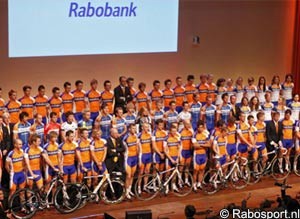More details emerge of financial support pledged by departing backer
 Although the existence of the team is guaranteed in the short term due to the agreement between it and the former backer, the squad previously known as Rabobank is continuing to look for a new title sponsor. As things stand the Dutch outfit is due to race as a ‘white label’ squad in 2013, but the aim is to have another arrangement in place and a new brand name on the jersey.
Although the existence of the team is guaranteed in the short term due to the agreement between it and the former backer, the squad previously known as Rabobank is continuing to look for a new title sponsor. As things stand the Dutch outfit is due to race as a ‘white label’ squad in 2013, but the aim is to have another arrangement in place and a new brand name on the jersey.
“We are in ongoing talks at the moment,” team spokesman Richard Plugge told VeloNation. “There are several potential sponsors, but the devil is in the detail and there is still a long way to go at present. It’s too soon to say what will happen. At present, there are a lot of people interested in finding out how much it would cost, what would be involved, how much they would get in terms of exposure. We’ll continue working in this area and see what happens.”
On October 19th Rabobank announced that it was leaving pro cycling as a result of the USADA report into doping by Lance Armstrong and the US Postal Service team. While most of the evidence dates back to a period between 1999 and 2005, the Dutch bank said that it felt the USPS affair nevertheless impacted on how it currently sees the sport.
“It is with pain in our heart, but for the bank this is an inevitable decision. We are no longer convinced that the international professional world of cycling can make this a clean and fair sport,” he said. “We are not confident that this will change for the better in the foreseeable future.”
That stance was contrasted by statements from riders and other backers, who said that cycling had improved ethically since Armstrong won his Tours.
The Belgian national lottery, which makes up one half of the title sponsorship of the Lotto-Belisol team, stated that it didn’t agree with Rabobank’s withdrawal. It said that it “opts for a different approach, in particular the move towards a pure cycling. The large number of cycling fans are entitled to a sport where everyone competes on an equal footing and therefore has an equal chances of success…
“Sponsors who believe in the future of cycling should not continue to look back on yesterday but today, with the experience of the past, to look to tomorrow and help build the future of cycling.”
Speaking about the current arrangement with Rabobank, Plugge clarified what agreement was in place. “Dutch employment law has strict regulations about what happens when somebody is sacked,” he explains. “You have to pay off the contracts, and so Rabobank guarantees that we can finish properly what was arranged.”
He said that fact safeguard’s the team’s existence next season, but also that if a rider has an existing agreement extending beyond 2013, that their contract will continue to be paid by Rabobank. However for anyone whose current deal ends next season, they will not be covered beyond that point.
As this would leave the team short of numbers, it makes it crucial to secure a new backer in order to guarantee the long term future. Plugge said that once a new sponsor is found, they will have to take over the contractual obligations from Rabobank.
While the men’s team is under a certain degree of pressure to sort out a new arrangement, the women are in a more secure position. Plugge clarified what is a separate arrangement for them. “Rabobank said that whatever happens, the women’s team will continue,” he said, confirming that they are safe until the next Olympics.
“If the team does not find a new sponsor in the years following next season, then Rabobank has said it will guarantee that the women will be supported.”
This means that not only will Olympic and world champion Marianne Vos be guaranteed backing, but so too will her team-mates.